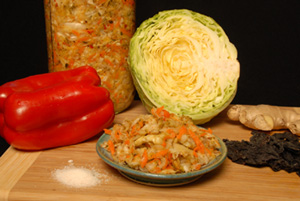 When Something's Missing From Your Meal…
When Something's Missing From Your Meal…
Have you ever noticed that sometimes after you've finished a meal, you don't feel satisfied? Something was missing, but you can't put your finger on what it may be.
It's possible that some of the 10,000 taste buds on your tongue didn't get enough stimulation with that meal. With taste buds for sweet, sour, salty, bitter and savory (a specific taste found in the amino acids of protein), it can be difficult to keep all five "buds" satisfied.
It's quite easy to satisfy the sweet, salty, bitter and savory taste buds, but to activate the sour ones, it will take a bit, not much, of menu planning.
Cultured foods can fill that missing gap in the meal and make the process easy. These foods simply start with a whole, natural food, and change it to a new, slightly sour food with a different texture within a matter of hours through a process of fermentation. The process is totally natural.
Cultured foods include foods such as sauerkraut, Kim Chee, cheese, kefir and yogurt, but other foods can be cultured, including soybeans, eggplant, cucumbers, and turnips. In different cultures, whatever vegetable is in season is used for culturing.
We Need Bacteria in Our Intestinal Tract
The two primary reasons why cultured foods need to be a part of one's diet are: 1) to provide that complete stimulation for the taste buds, and 2) to support the microbial flora in the intestinal tract.
 Surprisingly, we're all "walking bags of bacteria." Our body is comprised of 10 trillion body cells that collectively compose our organs, bones, nervous system, muscles, skin, hair and nails. However, inside the numerous feet of our intestinal tract is an estimated 100 trillion live bacteria, viruses, fungi, parasites of about 500 different species; both good and bad, that set up their own environment for either health or illness. A 'good' or 'friendly' species is one that synthesizes different vitamins and when in high numbers, creates health. A 'bad' species is one that creates disease or pathology in the body by its presence in high numbers. Collectively, the good and bad microbes are called flora.
Surprisingly, we're all "walking bags of bacteria." Our body is comprised of 10 trillion body cells that collectively compose our organs, bones, nervous system, muscles, skin, hair and nails. However, inside the numerous feet of our intestinal tract is an estimated 100 trillion live bacteria, viruses, fungi, parasites of about 500 different species; both good and bad, that set up their own environment for either health or illness. A 'good' or 'friendly' species is one that synthesizes different vitamins and when in high numbers, creates health. A 'bad' species is one that creates disease or pathology in the body by its presence in high numbers. Collectively, the good and bad microbes are called flora.
It's entirely possible that your intestinal microbes could be signaling to you at the end of a meal with a message of "feed me!" through that feeling that there's something missing from the meal. Cultured foods not only feed the flora; they also restore the healthy balance between the good microbes and the bad ones and contribute to optimum functioning of every organ in the body.
We're Out of Balance
The reason why it's important to incorporate more appropriate live flora on a daily basis is that it's easy to get out of balance with these microbes. One dose of a broad-spectrum antibiotic will annihilate the good and bad bacteria together, similar to a terrorist act at the microscopic level, within your intestines! The antibiotic may not kill resistant fungi or parasites, though, which then gives them the chance to proliferate wildly. Even an antibiotic that is more specific will still have terrorist actions on your gut microbes.